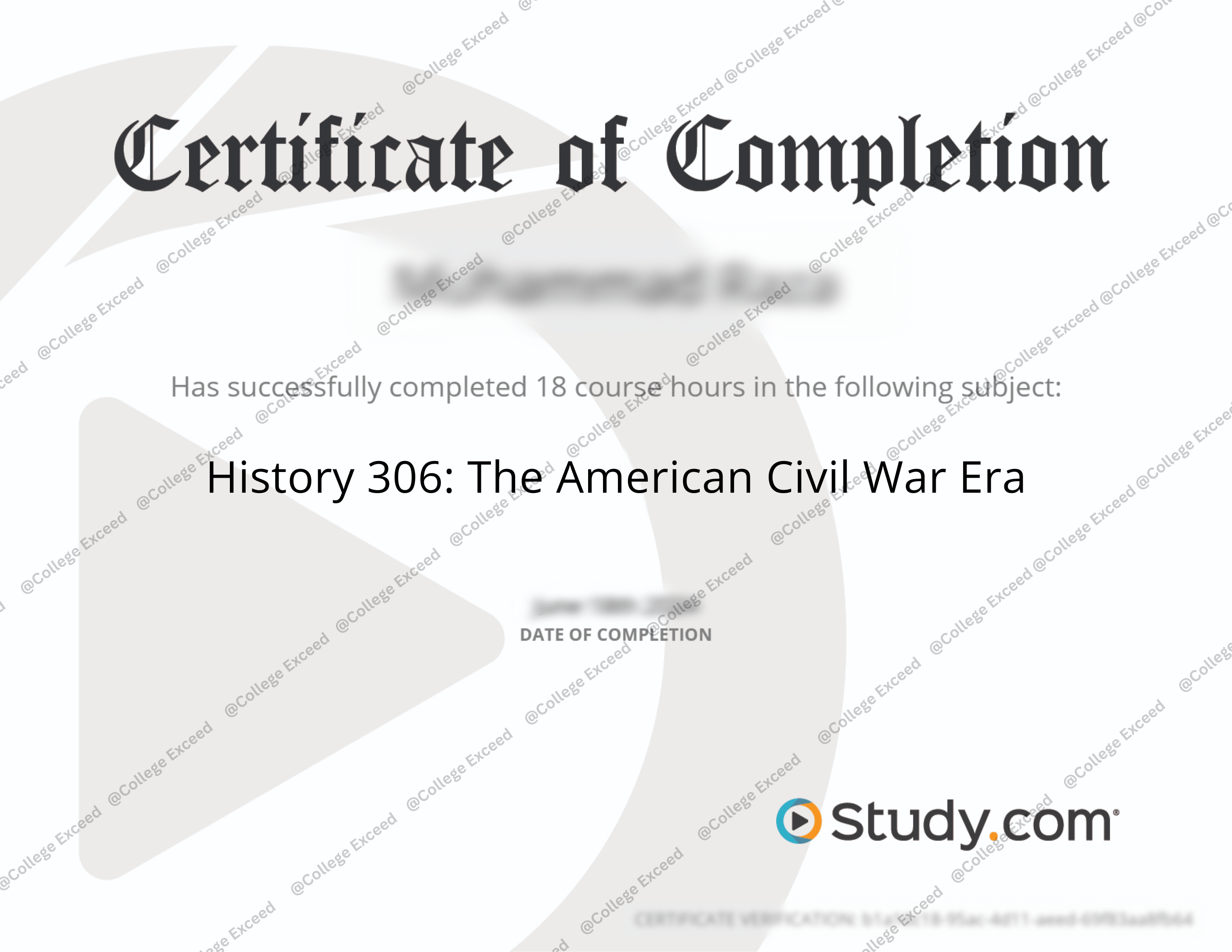
-
Gavin Walton
- October 22, 2024
If you are on the verge of embarking on study.com History 306: The American Civil War Era, prepare yourself to learn one of the most significant eras in American history. This course will guide you through America’s history in relation to the Civil War; from the reasons that led to the war such as economics and politics; through the main war battles, leaders, and the aftermath or rebuilding of the country after the war. No matter what kind of learner you are, whether you love history or you’re simply studying it in school we have got you covered.
But do not despair – this will not turn into a boring lecture on history that most of you probably slept through once in elementary school. Think of it as storytelling with a purpose: which is very handy in assisting you to pass your exam without any hassle. The aim here is to present the Civil War Era in a way that you can easily understand without being confronted with too many dates and names. So grab a seat please, because we’re all about to embark on the creation of history. Well, a lot more fun (and passable!) I needed to trademark my sense of humor so that none of the humorists could copy me!
---

What to Expect from Study.com History 306 Class 📖
Well, what is the idea with study.com History 306: The American Civil War Era? Well, this course focuses on one of the most important periods of American history, but do not let it discourage you – I will be your guide.
In this class, you are going to learn about various subjects including the causes of the Civil War including slavery issue, and the growing political differences between the Northern and Southern states. You will also learn about the actual war itself, such as the battle of Gettysburg and Antietam, strategies of the Union and Confederate armies, and the role of such people as Abraham Lincoln and Robert E. Lee among others. These are areas that fall under the list of high possibility of being tested on therefore you should ensure you focus on them.
You will also learn the effects of the war on people in detail covering soldiers, civilians, African Americans, and women. Reconstruction of the South as well as an attempt to assimilate freed persons of color back into American society will also be discussed. One of these areas is this concept, which seems to confuse the majority of learners; hence, ensure you grasp its concepts properly because you are likely to find it in the exams.
Thus, this class will provide information on the pre-Civil War period, Civil War, as well as the post-war period. But most importantly you will come to understand how these events moved shaped the United States of today. Oh well, you better prepare yourself for some of these will be covered a lot in class, so better find out now!
Week-by-Week Study Plan to Ace Study.com History 306 Exam📝
Well, here is a week-by-week plan that will ensure that you have a clear timetable and are in a position to crack your studies. Take the exam for History 306: The American Civil War Era. Our experts have prepared the following tests for you: Therefore they will not be aligned with the cramming style of study.
Week 1: Get the Lay of the Land
In order to provide a general context to the Civil War Era, begin with an introduction on this topic. View Crash Courses on YouTube (there are many playlists: Crash Course US History, in which key information is described briefly and comprehensively). Try hard to understand the following the cause of war, events that led to the war, and political leaders involved in the war. This shall provide a good background for the analysis that shall then zoom into individual battles and strategies.
- External Resources:
Week 2: Dive into the Early Battles
This week, pay the most attention to the main military and political characters – Abraham Lincoln, Ulysses S. Grant, Robert E. Lee, and Jefferson Davis, and their contribution to the war. Moreover, learned about Union and Confederate generals’ plans of action, Grant’s Anaconda Plan, and Lee’s propulsive assault.
- External Resources:
Week 3: Study the Major Players and Strategies
It is a subject that has a lot of challenges when it comes to reconstruction hence, many students find it as a tough-hatch. Think about amendments that took place during this period (13th, 14th, and 15th), the Freedmen’s Bureau, and the emergence of Jim Crow laws. Use external resources.
- External Resources:
Week 4: Delve into Reconstruction
Reconstruction tends to trip up a lot of students. Focus on the amendments passed during this period (13th, 14th, and 15th), the Freedmen’s Bureau, and the rise of Jim Crow laws. Use external resources to clarify any confusing terms or concepts.
Week 5: Review & Practice
Time to review everything! Go back through your notes and flashcards, and take practice quizzes on study.com to identify any weak spots. You should also revisit the battles, political figures, and Reconstruction concepts that are still unclear. Make use of any interactive maps or timelines to reinforce your understanding of the sequence of events.
- External Resources:
- Practice Quiz: Civil War Battles
- Civil War Animated Maps
Week 6: Mock Exam & Last-Minute Review
This is it—test yourself with a full-length mock exam! Set a timer and treat it like the real deal. Once you’ve finished, go over the questions you got wrong and make sure you understand why. Focus your final review on the most heavily weighted topics, like Reconstruction and key Civil War battles.
- External Resources:
That’s your roadmap!
---
Key Topics to Focus in History 306 📂
- Crash Course US History Playlist
Crash Course has always been able to make even the most complicated history episodes engaging and easy to digest. Its videos on the Civil War and Reconstruction offer a strong base from which a person beginning with Civil War topics can start.
- Link: Crash Course US History
- History Channel – Civil War Specials
The History Channel pretty much has a wealth of documentaries and features relating to the Civil War. They provide analyses of the different fights, tactics employment, and political actions that occurred during the war. Try to find the Civil War documentaries in order to have a greater view of key moments.
- The American Battlefield Trust – Animated Battle Maps
American Battlefield Trust presents magnificent animated maps that present the fights of the Civil War and help visualize movements, plans, and results. This is especially helpful when reviewing some of the major battles discussed in study.com History 306.
- Quizlet Flashcards for the Civil War
That is why Quizlet is abundant with flashcards and the information is provided by students and teachers all over the world, they have covered almost all possible topics related to the Civil War such as the battles, political leaders, and much more including Reconstruction. It is ideal for a form of refresher, whenever there is a need to reintroduce something or sum up some content.
- U.S. National Archives – Primary Source Documents
Primary sources appear to be some of the most effective means of understanding the Civil War on different levels. The U. S. National Archives provides a collection of letters, proclamations as well as other documents from the Civil War period; they help you catch the feel of the period you are studying.
---
Key Battles and Events to Focus On in the Civil War Era🔑
To assist you in preparing for the study.com History 306: The American Civil War Era, it is recommended that you concentrate on some important areas that may be examined. In this post, I’m going to dissect four major ideas to make it easy for everyone to understand them.
- The Causes of the Civil War: Sectionalism vs. Slavery
There is a question that I think generated a lot of discussion in this class: what caused the Civil War? Was it sectionalism, the North, South economy, or just slavery issue? Let’s break it down in the table below:
Sectionalism | Slavery |
|---|---|
Focused on economic and political divisions between the North (industrial) and the South (agricultural). | The central moral issue, slavery, was directly tied to the economy and political disputes. |
North favored tariffs and federal power, South wanted state power and no tariffs. | The Southern economy was deeply reliant on enslaved labor, which the North opposed. |
Sectionalism increased tensions but slavery was the moral and social tipping point. | Slavery was the issue that made war inevitable, causing ideological and political splits. |
- Lincoln’s Emancipation Proclamation: Its Real Impact
The Emancipation Proclamation wasn’t an immediate liberation of slaves from bondage but it was a change of focus of the war. Here’s what you need to know:
Before Proclamation | After Proclamation |
|---|---|
The North was fighting primarily to preserve the Union. | Shifted the goal of the war to include ending slavery. |
Slavery still existed in the border states loyal to the Union. | Freed enslaved people in Confederate territories only. |
Mixed support from European nations who relied on Southern cotton. | Strengthened the Union’s moral cause, gaining support from abolitionists and preventing European interference. |
- Reconstruction: Successes vs. Failures
It can be argued that reconstruction after the Civil War was a sort of civilization with its gains and losses. Let’s compare the successes and failures:
Successes | Failures |
|---|---|
Passage of the 13th, 14th, and 15th Amendments (abolishing slavery, granting citizenship, and voting rights). | Rise of the Ku Klux Klan and Black Codes, limiting African American rights. |
Rebuilding of the Southern economy with new infrastructure and industry. | The sharecropping system kept many freedmen in a cycle of poverty. |
Temporary political participation of African Americans in Southern governments. | Redeemers (Southern Democrats) eventually rolled back much of the progress through Jim Crow laws. |
- Major Civil War Battles: Turning Points
Several battles during the Civil War were significant turning points. Let’s compare two of the most important ones:
Battle of Gettysburg | Battle of Vicksburg |
|---|---|
Fought in July 1863, marked the furthest Northern advance of Confederate forces. | Captured by Union forces in July 1863, gaining full control of the Mississippi River. |
Resulted in a major Union victory, turning the tide in the Eastern theater. | Split the Confederacy in two, dealing a major strategic blow. |
Often considered the “beginning of the end” for the Confederacy. | Strengthened Union’s hold on the West, crucial for their overall victory. |
These are among the basic areas of knowledge that are very helpful in pursuing any course and I think it has prepared me for the exam.
---
Study.com History 306 FAQ❓
Q: What are the possible strategies to employ while preparing for the exam?
A: When developing your study schedule as in this article, begin to plan out your study schedule then divide the topics into sections that you can easily grasp. Read each chapter carefully, make use of flashcards for the terms and conditions, and take tests on study.com so that you can refresh yourself with the basics.
Q: Are there certain battles that I must remember for the exam?
A: Yes indeed the most crucial and famous battles are the Battle of Gettysburg, the Battle of Antietam, the first and the second Battle of Bull Run, and the Battle of Vicksburg. You should focus on its outcomes, importance, and the persons who participated in it.
Q: How relevant is the Emancipation Proclamation for the exam?
A: The Emancipation Proclamation is a significant event in the history of the Civil War, from both – ethical and tactical perspectives. That means that one is likely to be asked about the effects that it had on the aims and objectives of the war as well as what part it played towards foreign policy and diplomacy of the Union’s win.
Q: What is the level of emphasis given to the Reconstruction Era?
A: The Reconstruction Era is very important because it marks the time right after the war looking at how the country attempted and in most cases failed to reconstruct itself. You will need to pay attention mainly to the Reconstruction Amendments, the Freedmen’s Bureau, and the political rivalry between the Radical Republicans and President, Andrew Johnson.
Q: Do I have to memorize all the generals’ names and their assignments to armies?
A: You don’t need to remember all of the generals but you should remember Ulysses S. Grant, Robert E. Lee, William T. Sherman, and Stonewall Jackson. Knowing about their leadership and strategies does aid you with multiple-choice questions and essay questions.
---
Closing Thoughts on Mastering the American Civil War Era📄
Congratulations! You now know about the guidelines that can enhance your success in studying effectively. This course is filled with significant events, profound military tactics, and people who played a role in the formation of the United States at the time which is highly appreciated today. Still, I am sure that with proper time management, sources, and concentration on the essential points, you will have no questions about the exam’s success.
This means, you need not memorize facts pertaining to the Civil War and Reconstruction Era and all related facts and figures, but must be able to understand the causes that led to it, the effects that a resulting war had, and its consequent legacy. But if you divide these major events and try to understand what happened in a week, it won’t be too difficult for you to absorb all this information. It could also be said that luck plays a significant role in accomplishing a particular goal and thus, one should always wish the best or be optimistic by saying just ‘‘let the luck be with you!’’. You’ve got this!



